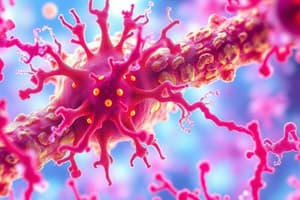Podcast
Questions and Answers
What is the primary function of antigens?
What is the primary function of antigens?
- To recognize foreign invaders and elicit specific responses from hosts (correct)
- To produce antibodies and activate phagocytes
- To initiate the destruction of associated organisms
- To patrol the blood and lymph and kill own cells
What is the main difference between neutrophils and macrophages?
What is the main difference between neutrophils and macrophages?
- Their size, with macrophages being larger
- Their ability to circulate in the blood
- Their function, with neutrophils healing tissue and macrophages attacking antigens
- Their lifespan, with neutrophils dying after attacking antigens (correct)
What is the role of Natural Killer (NK) cells?
What is the role of Natural Killer (NK) cells?
- To provide the first line of defense against microbes
- To produce antibodies and activate phagocytes
- To patrol the blood and lymph and activate the adaptive response
- To recognize and destroy infected cells and tumor cells (correct)
What is the purpose of the innate response?
What is the purpose of the innate response?
What is the function of phagocytes?
What is the function of phagocytes?
What is the role of epitopes?
What is the role of epitopes?
What is the purpose of antimicrobial substances?
What is the purpose of antimicrobial substances?
What is the main difference between the innate and adaptive responses?
What is the main difference between the innate and adaptive responses?
Which type of immunity develops through direct exposure to an antigen?
Which type of immunity develops through direct exposure to an antigen?
What is the primary function of B-lymphocytes?
What is the primary function of B-lymphocytes?
What is the function of plasma cells?
What is the function of plasma cells?
What is the primary function of IgA?
What is the primary function of IgA?
What is the function of antigen-presenting cells?
What is the function of antigen-presenting cells?
What is the function of T-helper cells?
What is the function of T-helper cells?
What is the function of regulatory T-cells?
What is the function of regulatory T-cells?
What is the term for the ability to distinguish between self- and non-self antigens?
What is the term for the ability to distinguish between self- and non-self antigens?
What is the term for the immune response against the body's own tissues?
What is the term for the immune response against the body's own tissues?
What is the term for the binding of autoantibodies with self-molecules?
What is the term for the binding of autoantibodies with self-molecules?
What is the primary antigen involved in Erythroblastosis Fetalis?
What is the primary antigen involved in Erythroblastosis Fetalis?
Which type of hypersensitivity reaction is characterized by the formation of antigen-antibody complexes?
Which type of hypersensitivity reaction is characterized by the formation of antigen-antibody complexes?
What is the primary mediator of Type I - Immediate Hypersensitivity reactions?
What is the primary mediator of Type I - Immediate Hypersensitivity reactions?
Which of the following is an example of a Type II - Antibody Mediated Hypersensitivity reaction?
Which of the following is an example of a Type II - Antibody Mediated Hypersensitivity reaction?
What is the primary mechanism of tissue damage in Type IV - Delayed or Cell-Mediated Hypersensitivity reactions?
What is the primary mechanism of tissue damage in Type IV - Delayed or Cell-Mediated Hypersensitivity reactions?
Which type of hypersensitivity reaction is responsible for Polyarteritis Nodosa?
Which type of hypersensitivity reaction is responsible for Polyarteritis Nodosa?
What is the primary role of IgE in hypersensitivity reactions?
What is the primary role of IgE in hypersensitivity reactions?
Which of the following is an example of a Type III - Immune Complex Mediated Hypersensitivity reaction?
Which of the following is an example of a Type III - Immune Complex Mediated Hypersensitivity reaction?
What is the primary mechanism of Type II - Antibody Mediated Hypersensitivity reactions?
What is the primary mechanism of Type II - Antibody Mediated Hypersensitivity reactions?
Which type of hypersensitivity reaction is responsible for Contact Dermatitis?
Which type of hypersensitivity reaction is responsible for Contact Dermatitis?
Flashcards are hidden until you start studying
Study Notes
Immune System
- The immune system is the body's defense against foreign invaders, providing protection from disease and infectious disease.
- Immunity is based on the capacity to recognize foreign invaders (non-self).
Microbes and Antigens
- A microbe is a type of microorganism that is too small to see with the unaided eye, such as bacteria, viruses, and fungi.
- A microbe that causes disease is called a pathogen.
- An antigen is a large molecule (usually a protein or polysaccharide) on a cell surface that elicits a specific response from the host.
- An epitope is a part of an antigen molecule to which an antibody attaches.
Immune Response
- The immune response is the collective, coordinated response of the cells and molecules of the immune system to protect against infectious disease.
- There are two types of immune responses: innate and adaptive.
Innate Response
- The innate response is a non-specific, initial line of defense that provides an effective barrier to microbes.
- It is something we are born with and is the first line of defense against infection.
Adaptive Response
- The adaptive response is a specific response that develops with exposure to various organisms and substances that the immune system finds threatening.
- It is very effective and involves the activation of immune cells, such as B-cells and T-cells.
B-Cells and T-Cells
- B-cells (B-lymphocytes) are key players in humoral immunity, recognizing microbes and antigens, and producing antibodies.
- T-cells (T-lymphocytes) are responsible for cell-mediated/cellular immunity and work via cell-to-cell contact or by secreting messenger compounds that communicate with immune system cells.
Types of T-Cells
- T-Helper cells (CD-4 cells) upregulate and are key regulatory cells of the immune system.
- Regulatory T-cells (Tregs) downregulate and suppress/modify immune responses.
- T-cytotoxic cells (CD-8 cells) destroy identified/presented antigens and kill virus-infected cells.
Antigen Presenting Cells
- These cells bind to and/or break down antigens and present epitopes on their surfaces, or alter the antigen to make it more recognizable.
Humoral Immunity and Immunoglobulins
- Humoral immunity involves the production of antibodies by B-cells.
- There are different types of immunoglobulins (Ig), such as IgG, IgA, and IgM, each with specific functions.
Active and Passive Immunity
- Active immunity develops through direct exposure to an antigen.
- Passive immunity is passed from a mother to fetus, or injected from one system to another.
Autoimmune Diseases
- Immunologic self-tolerance is the ability to distinguish between self- and non-self antigens.
- Autoimmune diseases, such as Rheumatoid Arthritis, Multiple Sclerosis, and Myasthenia Gravis, occur when the immune system mounts a response against the body's own tissues.
Hypersensitivity Disorders
- Hypersensitivity disorders occur when the immune system overreacts to antigens, leading to inflammation and tissue damage.
- There are four types of hypersensitivity reactions: Type I (Immediate), Type II (Antibody-mediated), Type III (Immune Complex-mediated), and Type IV (Delayed or Cell-mediated).
Type I Hypersensitivity
- Mediated by IgE, leading to the release of inflammatory mediators from sensitized mast cells.
- Examples include allergic rhinitis, asthma, urticaria, angioedema, and gastrointestinal food allergies.
Type II Hypersensitivity
- Mediated by IgM or IgG, directed against target antigens on cell surfaces or in extracellular tissue.
- Examples include hemolysis, erythroblastosis fetalis, autoimmune hemolytic anemia, blood transfusion reactions, and autoimmune thrombocytopenia.
Type III Hypersensitivity
- Mediated by the formation of antigen-antibody complexes, complement fixation, and localized inflammation.
- Examples include the Arthus reaction, serum sickness, glomerulonephritis, and polyarteritis nodosa.
Type IV Hypersensitivity
- Mediated by specifically sensitized T-lymphocytes, manifesting as sub-acute or chronic inflammation.
- Examples include contact dermatitis and graft rejection.
Studying That Suits You
Use AI to generate personalized quizzes and flashcards to suit your learning preferences.




